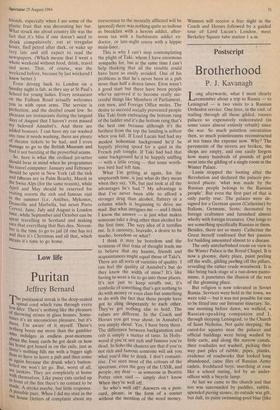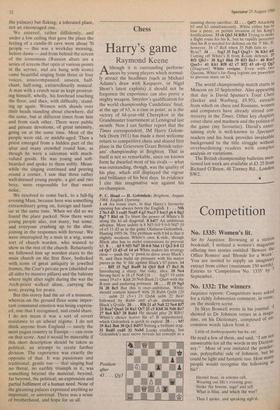Postscript
Brotherhood
P. J. Kavanagh
T ong afterwards, what I most clearly L./remember about a trip to Russia — to Leningrad — is two visits to a Russian Orthodox service. One tires, in the end, of trailing through all those gilded, rococo palaces so expensively redecorated (in some cases almost entirely rebuilt) since the war. So much pointless ostentation then, so much pointlessness reconstructed at ten times the expense now. Why? The pavements of the streets are broken, the shops are empty, and one easily forgets how many hundreds of pounds of gold went into the gilding of a single room in the Winter Palace.
Lenin stopped the looting after the Revolution and declared the palaces pro- tected places: 'what was made by the Russian people belongs to the Russian people'. But even the first part of that is only partly true. The palaces were de- signed for a German queen (Catherine) by Italians, Germans, Scots; decorated by foreign craftsmen and furnished almost wholly with foreign treasures. One longs to see something specifically Russian in them. Besides, there are so many. Catherine the Great herself confessed that her passion for building amounted almost to a disease.
The only unrefurbished room on view'in the Winter Palace is the Royal Chapel. It is now a gloomy, dusty place, paint peeling off the walls, gilding peeling off the pillars, revealing the rather crude woodwork. It is like being back-stage at a run-down panto- mime, it punctures the illusion of the rest of the gleaming place.
But religion is now tolerated in Soviet Russia. Services were held in the town, we were told — but it was not possible for one to be fitted into our Intourist itinerary. So, one morning before dawn, we walked, a Russian-speaking companion and 1, through sleeping Leningrad, to the Church of Saint Nicholas. Not quite sleeping; the cared-for squares near the palaces and official buildings were being washed by little carts, and along the narrow canals, their roadsides not washed, picking their way past piles of rubble, pipes, planks, evidence of roadworks that looked long abandoned, came files of Russian Army cadets, freshfaced boys, marching at ease like a school outing, led by an under- officer with a bicycle lamp.
At last we came to the church and that too was surrounded by puddles, rubble, upended paving stones; its outside was gilt, but dull, its paint swimming-pool blue (like the palaces) but flaking; a tolerated place, not an encouraged one.
We entered, rather diffidently, and under a 16w ceiling that gave the place the feeling of a candle-lit cave were about 70 people — this was a weekday morning, before dawn — and from behind the screen of the iconostasis (Russian altars are a series of screens that open at various points in the service, and are hung with icons) came beautiful singing from three or four voices, unaccompanied, unseen, half- chant, half-song, extraordinarily musical. A man with a crutch near us kept prostrat- ing himself, wholly, his forehead touching the floor, and then, with difficulty, stand- ing up again. Women with shawls over their heads standing about elsewhere, did the same, but at different times from him and from each other. There were public and private devotions, of great intensity, going on at the same time. Most of the people were old, or middle-aged. Then a priest emerged from a hidden part of the altar and many crowded round him, as though he were a salesman with much- valued goods. He was young and soft- bearded and spoke to them softly. Mean- while the singing continued and peering round a corner, I saw that three rather well-dressed young people, a girl and two boys, were responsible for that sweet noise.
We resolved to come back, to a full-fig evening Mass, because here was something extraordinary going on, foreign and famil- iar at the same time. When we did so we found the place packed. Now there were young people also, not many, but some, and everyone crushing up to the altar, joining in the responses with fervour. We were interrupted by a man in a wig, some sort of church warden, who wanted to show us the rest of the church. Reluctantly we followed him up wooden stairs to the main church on the first floor, bedecked with_icons of great antiquity in jewelled frames, the Czar's private pew (shielded on all sides by massive pillars) and the balcony where night after night during the war the Arch-priest walked alone, carrying the icon, praying for peace.
But this storey had the air of a museum, whereas on the ground floor some impor- tant communal emotion was being express- ed, one that I recognised, and could share.
I do not mean it was a sort of covert resistance to an atheist regime. I do not think anyone from England — surely the most pagan country in Europe — can crow on that score. And it would be miserable if this short description should be taken as political, an attempt to create further division. The experience was exactly the opposite of that It was passionate and traditional, gentle too — that singing had no threat, no earthly triumph in it, was something beyond the material, beyond, far beyond, the political; an expression and partial fulfilment of a human need. None of the gleaming palaces expressed anything so important, or universal. There was a sense of brotherhood, and hope for us all.







































 Previous page
Previous page